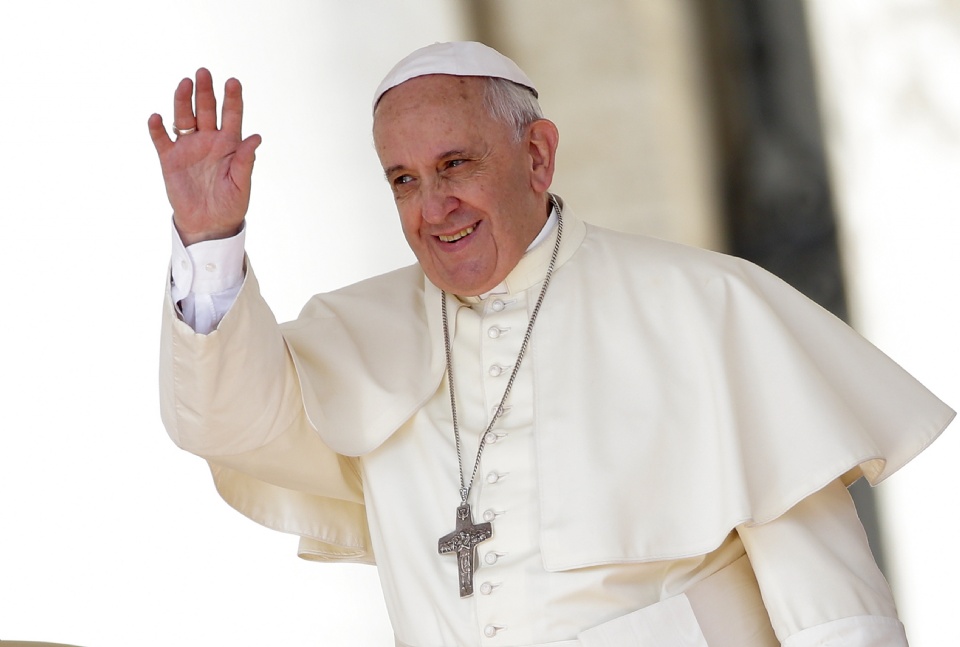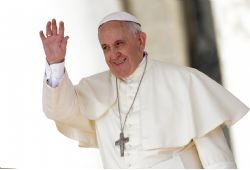Attitudes form the patterns of our lives. Changes of attitude are life-changers. Whatever life sends our way it is the
attitude with which we receive it that makes all the difference. We can be bitter or better. Attitude is a matter of choice. We chose how we see and act in life. We manage life and do not allow life to
manage us. Our attitude toward the whole
of life is what gives life meaning. Life
is what we make it.
No one seems to know this better than Pope
Francis. It began with his famous one
liner, “Who am I to judge?” It was
confirmed in two telephone calls to a teenager and a divorced woman who asked
him about receiving communion. Both had
written to him. His attitude to the teen
was that of a father and to the woman one that was non-judgmental. It is clear that the Papacy is being lived
out with a very pastoral attitude.
People count and humanity is the reason for religion. Francis’ outreach has brought to the public
eye a man who is just like you and me. He
understands the commandment, love your neighbor, he or she is just like
you.
There were many occasions in the years of each
new Pope that we learned how they would and did react to questions that were
posed to them. On a great variety of
subjects it became inevitable what their answers would be. Pope John XXIII was the exception. He called the Second Vatican Council in the
early 1960s. He called it a pastoral
council not a council to clarify the dogmas or teachings of the Church. The Church was at a “new dawn” and he “quite
disagreed with these prophets of doom who are always forecasting disaster, as
if the end of the world were at hand.”
The truths contained in doctrine are one thing, but the way the faith is
presented in primarily a pastoral manner.
Two intervening Popes,
John Paul II and Benedict XVI, were defenders of the doctrine of the church and
lacked a pastoral attitude which created a certain restorationism to a period
prior to the Second Vatican Council. “Coming
from the ends of the earth” as Francis himself referred to the process of his
election created a worldwide Church. He
began his first interview and responded to the question, “Who is Jorge Mario
Bergoglio?” With the response, “I am a sinner.”
He added that he “is close to the mystical movement” and the religious
mystic experiences the ground of being as basically friendly to the deepest
needs of the self. That which is unknown, strange, or beyond our comprehension
is with and for rather than against us.
A mystic is a person who brings hope to the darkest of places.
Francis’ attitude about
consultation is that he does not want token consultations, but real
consultations. He further adds, the
Synods of Bishops are, for example, important places to make real and active
this consultation. The world awaits the
results of the worldwide consultation on the Family, the subject of the Synod
of Bishops in October.
He speaks of the Church as the home of all, not a
small chapel that can hold only a small group of selected people. We must not
reduce the bosom of the universal church to a nest protecting our
mediocrity. In a world where so many
live in isolation, Francis reminds us that, “belonging to a people has a strong
theological value. In the history of salvation, God has saved a people. There
is no full identity without belonging to a people. No one is saved alone, as an
isolated individual, but God attracts us looking at the complex web of
relationships that take place in the human community. God enters into this
dynamic, this participation in the web of human relationships.” Francis has his eyes set on the Reign of God
and the Church as a means to enter the Reign of God.
In Francis’ pastoral exhortation entitled, Evangelii Gaudium - The Joy Of The Gospel, he
goes from strength to strength, respecting the past but opening new
interpretations of Christian life in the context of contemporary society. He discloses what he finds is new and needed
for the Church to bring Good News to the world.
I want a poor Church for the poor. I prefer a Church which is bruised, hurting
and dirty because it has been out on the streets, rather than a Church which is
unhealthy from being confined and from clinging to its own security… If nothing should rightly disturb us and
trouble our consciences, it is the faces that many of our brothers and sisters
are living without the strength, light and consolation born of friendship with
Jesus Christ, without a community of faith to support them, without meaning and
a goal in life. More than by fear of
going astray, my hope is that we will be moved by the fear of remaining shut up
within structures which give us a false sense of security, within rules that
make us harsh judges, within habits which make us feel safe, while at our door
people are starving and Jesus does not tire of saying to us; “Give them
something to eat.” (Mt 6;37)
Again and again Francis expresses his attitudes
without words but with action. He lives
in simplicity, welcomes the homeless to breakfast to celebrate his birthday,
walks spontaneously among people, leaves the Popemobile to greet embrace the
sick and the disfigured, puts aside the pomp and circumstances of a Medieval
Church, desacralizes the Papacy, offers interviews to journalists (even
atheists), enters the workers’ cafeteria unannounced, takes a tray and eats
with the Vatican workers and, as said previously, makes phone calls to people
who have written to him.
Life is life.
In the hustle and bustle of everyday life there is a spirituality to be
uncovered in the mystery of God’s active presence. Francis has said that the Resurrection is not
an event of the past, which we can see when Francis incarnates, as Jesus did,
attitudes which we would do well to emulate.

 In The Latest Issue:Latest Issue:
In The Latest Issue:Latest Issue:
- A Bittersweet Farewell
- The new Laval Aquatic Co...
- The End of an Era:
Articles
Calendar
Virtual- ANNUAL TEACHER APPRECIATION CONTEST
- APPUI LAVAL
- ARTS & CULTURE
- CAMPS
- CAR GUIDE
- CCIL
- CENTENNIAL ACADEMY
- CHARITY FUNDRAISING
- CITYTV
- COSMODÔME
- COMMUNITY CONNECTIONS
- COVER STORY
- DINA DIMITRATOS
- ÉCOLE SUPÉRIEURE DE BALLET DU QUÉBEC
- EDITORIALS
- ÉDUCALOI
- EDUCATION
- EMPLOYMENT & ENTREPRENEURSHIP
- FÊTE DE LA FAMILLE
- FÊTE DU QUARTIER SAINT-BRUNO
- FAMILIES
- FESTIVAL LAVAL LAUGHS
- FÊTE DE QUARTIER VAL-DES-BRISES
- FINANCES
- GLI CUMBARE
- GROUPE RENO-EXPERT
- HEALTH & WELL-BEING
- 30 MINUTE HIT
- ANXIETY
- CHILDREN`S HEALTH & WELLNESS
- CLOSE AID
- DENTAL WELLNESS
- EXTREME EVOLUTION SPORTS CENTRE
- FONDATION CITÉ DE LA SANTÉ
- GENERAL
- HEARING HEALTH
- MESSAGES FROM THE HEALTH AGENCY OF CANADA
- MENTAL HEALTH
- SEXUALITY
- SOCIAL INTEGRATION
- SPECIAL NEEDS
- TEENS
- THE NUTRITION CORNER
- THE NUTRITION CORNER - RECIPES
- VACATION DESTINATION
- WOMEN'S FITNESS
- WOMEN'S HEALTH
- HILTON MONTREAL/LAVAL
- HOME & GARDEN
- INTERNATIONAL WOMEN'S DAY
- JAGUAR LAVAL
- LAVAL À VÉLO
- LAVAL FAMILIES TV SHOW
- LAVAL FAMILIES MAGAZINE CARES
- LAVAL URBAN IN NATURE
- LE PARCOURS DES HÉROS
- LES PETITS GOURMETS DANS MA COUR
- LEON'S FURNITURE
- LEONARDO DA VINCI CENTRE
- LFM PREMIERES
- LIFE BALANCE
- M.P. PROFILE
- MISS EDGAR'S AND MISS CRAMP'S SCHOOL
- MISSING CHILDREN'S NETWORK
- NETFOLIE
- NORTH STAR ACADEMY LAVAL
- OUTFRONT MEDIA
- PASSION SOCCER
- PARC DE LA RIVIÈRE-DES-MILLE-ÎLES
- PÂTISSERIE ST-MARTIN
- PIZZERIA LÌOLÀ
- PLACE BELL
- PORTRAITS OF YOUR MNA'S
- ROCKET DE LAVAL
- SACRED HEART SCHOOL
- SCOTIA BANK
- SHERATON LAVAL HOTEL
- SOCIÉTÉ ALZHEIMER LAVAL
- STATION 55
- STL
- SUBARU DE LAVAL
- TECHNOLOGY
- TEDXLAVAL
- TODAY`S LAURENTIANS AND LANAUDIÈRE
- TODAY`S LAVAL
- WARNER MUSIC
- THIS ISSUE
- MOST RECENT
Magazine
The New Attitude of Pope Francis
Articles ~e 105,7 Rythme FM 4 chemins Annual Teacher Appreciation Contest Appui Laval Arts & Culture Ballet Eddy Toussaint Camps THIS ISSUE MORE...
CONTESTS Enter our contests
CONTESTS Enter our contests
CALENDAR
Events & Activities
COMMUNITY Posts Events
PUBLICATIONS Our Magazine Family Resource Directory
LFM BUSINESS NETWORK Learn more
COUPONS Click to save!
COMMUNITY Posts Events
PUBLICATIONS Our Magazine Family Resource Directory
LFM BUSINESS NETWORK Learn more
COUPONS Click to save!
SUBSCRIPTIONS
Subscribe to the magazine
Un-Subscribe
E-NEWSLETTER Subscribe to our E-newsletter Un-Subscribe
WRITE FOR US Guidelines & Submissions
POLLS Vote today!
E-NEWSLETTER Subscribe to our E-newsletter Un-Subscribe
WRITE FOR US Guidelines & Submissions
POLLS Vote today!
ADVERTISERS
How to & Media guide
Pay your LFM invoice
SUGGESTIONS Reader's Survey Suggest a Listing
LFM About Us Our Mission Giving Back Contact Us
SUGGESTIONS Reader's Survey Suggest a Listing
LFM About Us Our Mission Giving Back Contact Us
 PICK-UP LOCATIONS
Get a copy of LFM!
PICK-UP LOCATIONS
Get a copy of LFM!
TERMS & CONDITIONS Privacy | Terms
ISSN (ONLINE) 2291-1677
ISSN (PRINT) 2291-1677
Website by ZENxDESIGN




 BY:
BY: 
Tweet
Share